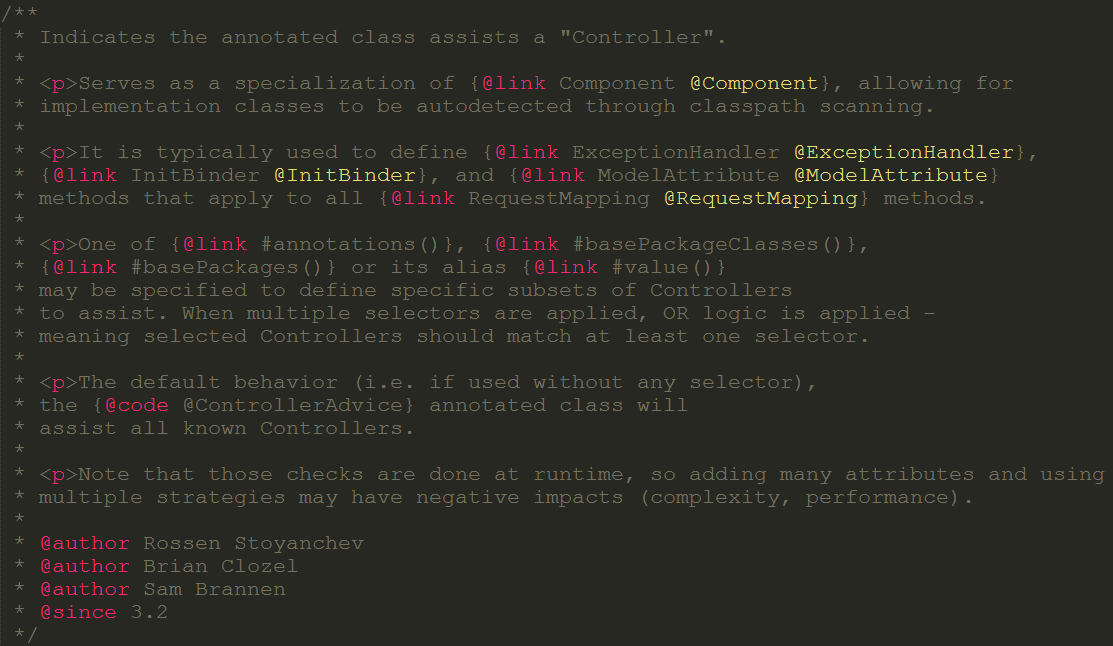@ControllerAdvice,是Spring3.2提供的新注解,从名字上可以看出大体意思是控制器增强。让我们先看看@ControllerAdvice的实现:
packageorg.springframework.web.bind.annotation;@Target(ElementType.TYPE)@Retention(RetentionPolicy.RUNTIME)@Documented@Componentpublic @interface ControllerAdvice{@AliasFor("basePackages")String[] value() default {};@AliasFor("value")String[] basePackages() default{};
Class<?>[] basePackageClasses()default {};
Class<?>[] assignableTypes()default {};Class<? extends Annotation>[]annotations() default {};
没什么特别之处,该注解使用@Component注解,这样的话当我们使用扫描时也能扫描到。
再一起看看官方提供的comment。
@ControllerAdvice是一个@Component,用于定义@ExceptionHandler,@InitBinder和@ModelAttribute方法,适用于所有使用@RequestMapping方法。- Spring4之前,
@ControllerAdvice在同一调度的Servlet中协助所有控制器。Spring4已经改变:@ControllerAdvice支持配置控制器的子集,而默认的行为仍然可以利用。 - 在Spring4中,
@ControllerAdvice通过annotations(),basePackageClasses(),basePackages()方法定制用于选择控制器子集。
不过据经验之谈,只有配合@ExceptionHandler最有用,其它两个不常用。
@ExceptionHandler和@ResponseStatus我们提到,如果单使用@ExceptionHandler,只能在当前Controller中处理异常。但当配合@ControllerAdvice一起使用的时候,就可以摆脱那个限制了。
- 1
- package com.somnus.advice;
- importorg.springframework.web.bind.annotation.ControllerAdvice;
- importorg.springframework.web.bind.annotation.ExceptionHandler;
- importorg.springframework.web.bind.annotation.ResponseBody;
- @ControllerAdvice
- public class ExceptionAdvice {
- @ExceptionHandler({ArrayIndexOutOfBoundsException.class })
- @ResponseBody
- public StringhandleArrayIndexOutOfBoundsException(Exception e) {
- e.printStackTrace();
- return "testArrayIndexOutOfBoundsException";
- }
- }
@Controller@RequestMapping(value ="exception")public classExceptionHandlerController {@RequestMapping(value = "e2/{id}",method = { RequestMethod.GET })@ResponseBodypublic StringtestExceptionHandle2(@PathVariable(value = "id") Integer id) {List<String> list =Arrays.asList(new String[]{"a","b","c","d"});return list.get(id-1);}}
当我们访问http://localhost:8080/SpringMVC/exception/e2/5的时候会抛出ArrayIndexOutOfBoundsException异常,这时候定义在@ControllerAdvice中的@ExceptionHandler就开始发挥作用了。
如果我们想定义一个处理全局的异常
- 1
- package com.somnus.advice;
- import javax.servlet.http.HttpServletRequest;
- importorg.springframework.core.annotation.AnnotationUtils;
- importorg.springframework.web.bind.annotation.ControllerAdvice;
- importorg.springframework.web.bind.annotation.ExceptionHandler;
- importorg.springframework.web.bind.annotation.ResponseBody;
- importorg.springframework.web.bind.annotation.ResponseStatus;
- @ControllerAdvice
- public class ExceptionAdvice {
- @ExceptionHandler({ Exception.class })
- @ResponseBody
- public StringhandException(HttpServletRequest request ,Exception e) throws Exception {
- e.printStackTrace();
- return e.getMessage();
- }
- }
乍一眼看上去毫无问题,但这里有一个纰漏,由于Exception是异常的父类,如果你的项目中出现过在自定义异常中使用@ResponseStatus的情况,你的初衷是碰到那个自定义异常响应对应的状态码,而这个控制器增强处理类,会首先进入,并直接返回,不会再有@ResponseStatus的事情了,这里为了解决这种纰漏,我提供了一种解决方式。
- package com.somnus.advice;
- import javax.servlet.http.HttpServletRequest;
- importorg.springframework.core.annotation.AnnotationUtils;
- importorg.springframework.web.bind.annotation.ControllerAdvice;
- importorg.springframework.web.bind.annotation.ExceptionHandler;
- importorg.springframework.web.bind.annotation.ResponseBody;
- importorg.springframework.web.bind.annotation.ResponseStatus;
- @ControllerAdvice
- public class ExceptionAdvice {
- @ExceptionHandler({ Exception.class })
- @ResponseBody
- public StringhandException(HttpServletRequest request ,Exception e) throws Exception {
- e.printStackTrace();
- //If the exception is annotated with @ResponseStatus rethrow it and let
- // the framework handle it - like the OrderNotFoundException example
- // at the start of this post.
- // AnnotationUtils is a Spring Framework utility class.
- if(AnnotationUtils.findAnnotation(e.getClass(),ResponseStatus.class) != null){
- throw e;
- }
- // Otherwise setup and send the user to a default error-view.
- /*ModelAndView mav = new ModelAndView();
- mav.addObject("exception", e);
- mav.addObject("url", request.getRequestURL());
- mav.setViewName(DEFAULT_ERROR_VIEW);
- return mav;*/
- return e.getMessage();
- }
- }
如果碰到了某个自定义异常加上了@ResponseStatus,就继续抛出,这样就不会让自定义异常失去加上@ResponseStatus的初衷。
作者:Franco蜡笔小强
来源:https://blog.csdn.net/w372426096/article/details/78429141

